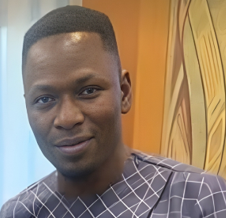– the story of Foster Mensah and Newmont Foundation
Set on becoming the proprietor of a thriving shoemaking business is thirty-one-year-old Foster Mensah who hails from Amanfrom, a small community in the Birim North district of the Eastern Region, Ghana.
With the economic instability that the world has been facing recently, coupled with a lack of direct support to persons like Foster, his dreams of acquiring the needed skills and starting his business seemed almost impossible – a predicament many young people are experiencing.
As if the challenging economic environment was not bad enough, Foster is physically disabled – the result of a life-threatening accident he was involved in. “I am a primary six dropout and so my opportunities are limited, but I still thought I could work hard and fend for myself. When I had the accident, however, I was shattered. Not only did I have to pay for my medical bills with little support, I lost my job which was my only source of income,” he said.
In 2022, through the Amanfrom community information system, Foster learnt of the Akyem Soft Skills and Sustainability Training programme being offered by Newmont Africa’s Akyem Development Foundation (NAkDeF). He immediately applied and was elated after being accepted into the programme.
“My physical disability did not hinder my commitment and belief in pursuing the programme. After all, Newmont Africa’s Foundation, which was set up for the community’s development, has a history of non-discriminatory behaviour so I was only hopeful of meeting the basic requirements. My conviction in learning shoemaking became stronger when I was selected because my dream was finally becoming a reality.”
Foster is now an apprentice under the programme. Apart from the monthly stipend he receives from the Foundation, he has also received free tools and basic inputs like gallons of glue, a hammer, pins, rope, cutting knife and scissors among others, to enhance his practical knowledge. His goal is to become a master-craftsman like Bismark Yirenkyi – an equally physically challenged man who has successfully completed the programme and is now self-employed with two apprentices at his dressmaking shop.
The Newmont Africa Akyem Development Foundation’s ASSIST programme has been specially designed to provide community members in the nine host communities – who could not benefit from the mainstream education system – an opportunity to gain relevant vocational and technical knowledge to improve their entrepreneurial skills and employability.
The programme covers a wide range of areas, including sewing/tailoring, hairdressing, carpentry, masonry, aluminum fabrication, welding, auto electronics, tiling, motor-bike mechanics, electronics, plumbing, auto-mechanics, cosmetology and catering.
A total of 320 beneficiaries have passed through the programme since 2017 so far, with a target of providing interested community youth with the needed support to engage in productive craftsmanship as long as the Foundation continues to be resourced.
The Newmont Africa Akyem Development Foundation was established in June 2014 as a community development vehicle to create sustainable social impact for the host communities. Newmont Africa’s Akyem operation invests US$1 for every ounce of gold sold and 1 percent of net profit before tax. By the end of December 2022, the Foundation had a total income of GH₵137million from Newmont Africa’s contributions and returns on investment.
Since its inception, the Foundation has disbursed GH₵26.3million in scholarships to residents of the host communities, ranging from high school to graduate studies. In January 2022, the Foundation established the well-resourced Akyem Vocational and Technical Institute (AVTI) to provide further skills enhancement opportunities for youth in the catchment area.
“The Foundation’s responsibility to host communities is pursued through an all-inclusive value creation approach that aims at transforming the lives of people like Foster Mensah and Bismark Yirenkyi. Through our partnership with the communities, we have no doubt that we can achieve this mandate,” stated the Foundation’s Executive Secretary, Paul Suchmann Apenu.










